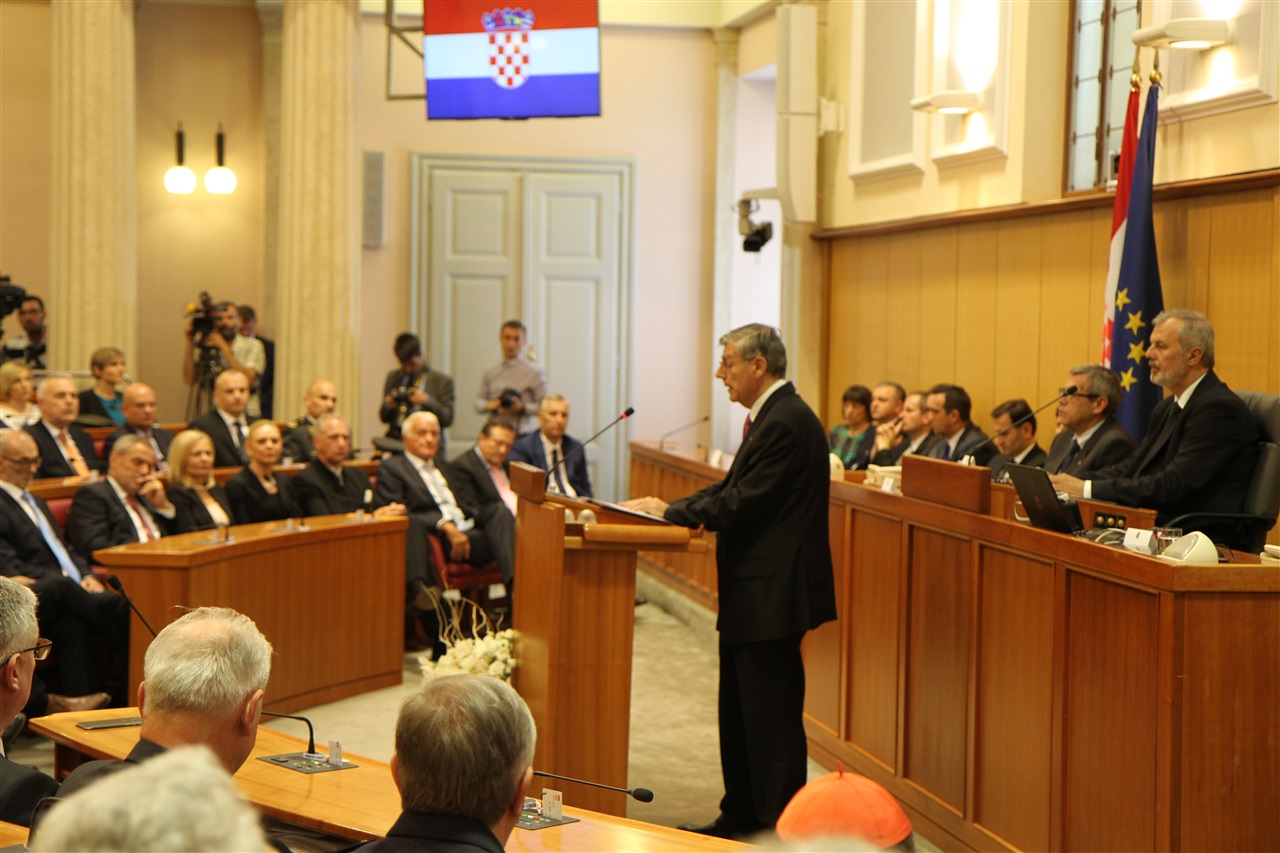
Zagreb - Statehood Day was celebrated on Saturday with a special session of the Croatian Parliament at which President Kolinda Grabar-Kitarović, Parliament Speaker Željko Reiner and Prime Minister Tihomir Oresković said that over the past quarter of a century Croatia had achieved a lot, calling for consensus on fundamental national interests and determination to realise that.
Grabar-Kitarović said that 25 years ago today, the national parliament adopted a historic decision on Croatia's sovereignty and independence. "Disarmed and without a built diplomacy, faced with the first terrorist attacks launched by the Greater Serbia aggressors and pressures from the international community, which was still devoted to the preservation of the Yugoslav federation, we stood very little chance for success. But we had what was most important -- a determined leadership with Dr Franjo Tuđman at its helm, who achieved national unity with the policy of reconciliation and unity between Croats at home and abroad," the president said.
She stressed that determination and unity were key to Croatia's success in the fight for independence and freedom and the demanding path of its international affirmation. Grabar-Kitarović stressed that in the coming period, Croatia must free itself of unnecessary ideological disputes, primarily those relating to WWII. "I don't mean that we need to keep quiet about it. On the contrary, it is our duty to be open to the historical truth. The state must be responsible and consistent in that, regardless of who is in power," the president said. "Our homeland needs nothing but us. Our success will be as big as our faith in ourselves," Grabar-Kitarović said.
Parliament Speaker Reiner recalled that 25 years ago, Croatia made a determined step towards the realisation of a dream that was hundreds of years old -- independence. He said the main objectives of Croatia today were faster economic growth and employment. "This is what people of Croatia expect from us politicians and this is what the future, even the survival of this country, depends on," Reiner said.
Prime Minister Orešković said Croatia had achieved a lot in the past 25 years. "We have become a stable and functional democracy, one of the guarantors of peace in this part of Europe and a part of the European family -- a member of NATO and the European Union. Membership of those organisations will help us be more successful in overcoming the challenges to come -- the challenges of globalisation, the financial and economic crisis, a new refugee wave and political instabilities in our neighbourhood, Orešković said.
He stressed, however, that there was a lot more Croatia could do. "Today we have our country, but we must invest more effort in building its institutions. We must insist on having our institutions act quickly and efficiently and always in the service of equity," Orešković said. The session was also attended by MPs, representatives of the judicial authority, the military, the police, veterans' associations, religious dignitaries, members of the diplomatic corps, representatives of universities, cultural and other public institutions, etc.
On June 25 1991, the Croatian parliament adopted a decision to launch the process of dissolution from other republics of the then Socialist Federal Republic of Yugoslavia (SFRY), following a referendum on independence held on May 19, 1991. However, the decision of independence did not come into force until three months later based on the Brijuni Declaration of July 7, at the request of the then European Community, in an effort to peacefully resolve the Yugoslav crisis.
Croatia officially became an independent state on 8 October 1991 when parliament unanimously adopted a decision to sever all state-legal ties with other republics and provinces of the SFRY. The decision on independence and sovereignty was preceded by a referendum when the majority of Croatians (92.18%) voted that Croatia should not remain in Yugoslavia.
Based on that will of the people, and with the breakdown of negotiations with former Yugoslav republics, the Croatian parliament convened all three houses that existed then and on 25 June adopted a constitutional decision which marked the start of disassociation from the other SFRY states and seeking international recognition. (Hina)